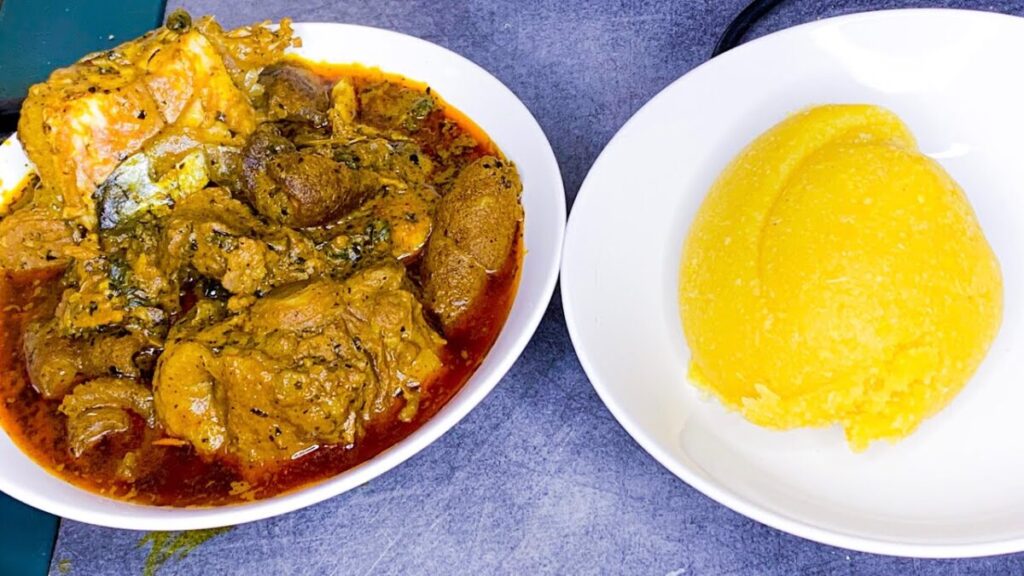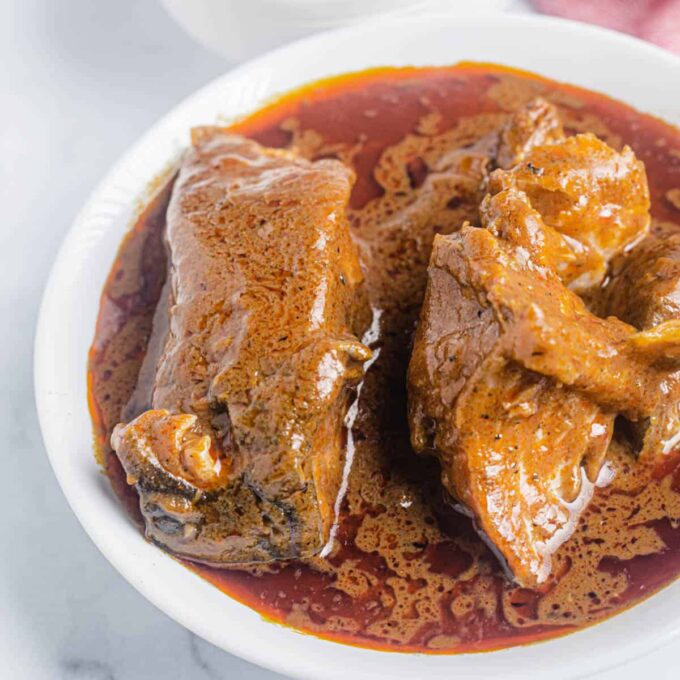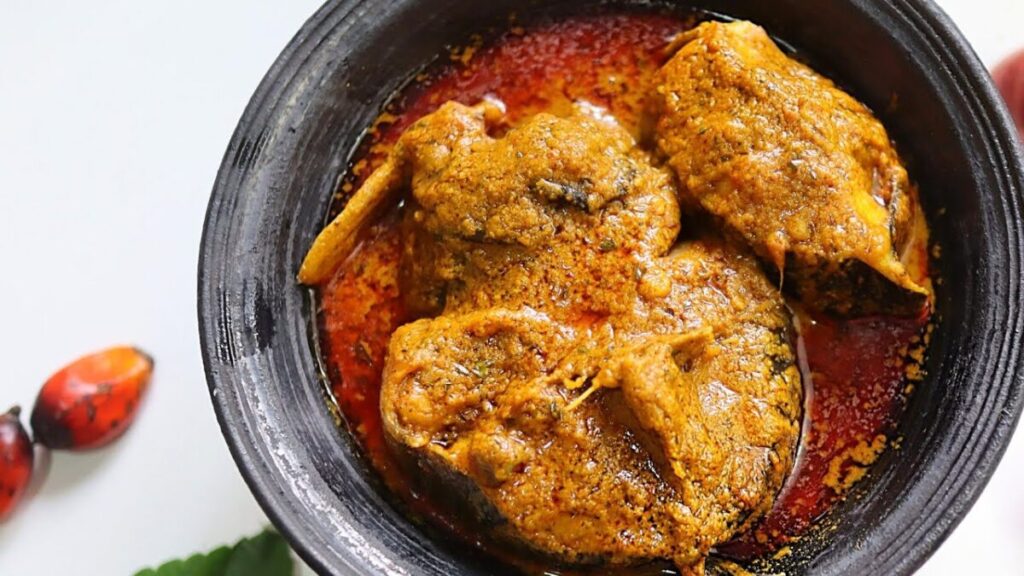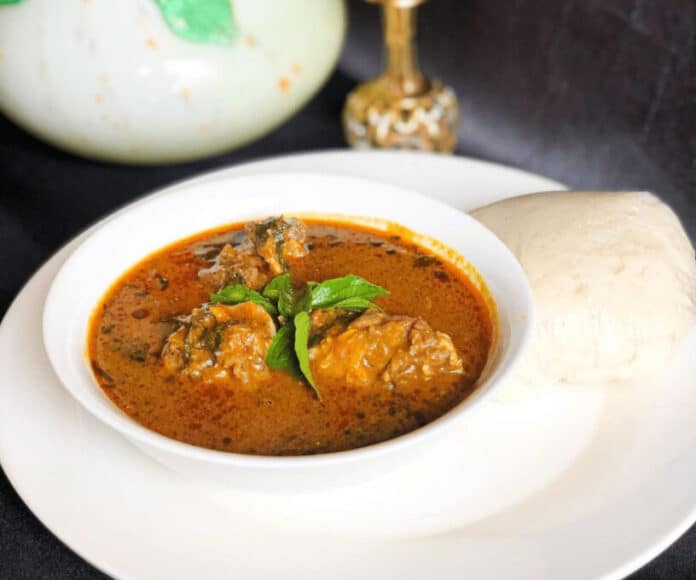Are you looking for a delicious and hearty dish to try out? With healthy nutrients? Why not learn how to make Banga soup?
Banga soup is a traditional Nigerian soup that originates from the Niger Delta region. It is also known as palm nut soup because it is made from the juice extracted from the palm nuts.
The soup is popular among the Urhobo, Isoko, and Itsekiri ethnic groups, but it is enjoyed by many other people in Nigeria and beyond. Banga soup is usually served with starchy side dishes such as fufu, Eba, or rice.
The soup is highly nutritious and flavorful and a staple dish in many Nigerian households. This article will explore the steps involved in making Banga soup and some tips for achieving the perfect taste and consistency.

CHECK THESE OUT:
How to Make Banga Soup
Ingredients For Banga Soup
The ingredients for making Banga soup may vary slightly depending on the recipe and personal preference, but the most common ingredients include:
- Palm nuts: These are the key ingredients in Banga soup. Palm nuts are usually bought in their raw form and then processed to extract the juice. The Canned palm nut fruit can be a substitute for fresh palm fruit if it is not available to you.
- Banga spice leaves: (Beletete leaves) you can buy a ready mix or simply make your own by blending Ataiko and Irugeje in a dry mill) and you can substitute with dried basil, bitter leaf, or dried scent leaves
- Oburunbebe stick: You can get this from the local market.
- Meat or fish: Different types of meat or fish can be used to add protein to the soup. Beef, goat meat, chicken, and fish are common choices.
- Spices: Various spices can be used to enhance the flavor of Banga soup, including crayfish, Utazi leaves, Ogiri (locust bean), and pepper soup spices.
- Seasoning cubes: These are commonly used to add flavor to the soup. Maggi or Knorr cubes are popular choices.
- Salt: Salt is used to taste.
- Water is used to extract the juice from the palm nuts and cook the soup.
Some recipes may also call for additional ingredients such as periwinkle, stockfish, or smoked fish. It is important to prepare all the ingredients before starting the cooking process to ensure a smooth and efficient cooking experience.
Preparing the palm nut for Banga soup
Preparing the palm nuts is an important step in making Banga soup. Here are the steps to prepare the palm nuts:
1. Select fresh palm nuts
Choose fresh palm nuts that are not discolored, cracked or spoiled. You can find palm nuts in African or international grocery stores or markets.
2. Clean the palm nuts
Rinse the palm nuts thoroughly in clean water to remove any dirt or debris.
3. Boil the palm nuts
Place the palm nuts in a pot and add enough water to cover them. Boil the palm nuts for about 20-30 minutes or until they are soft.
4. Cool the palm nuts
Once the palm nuts are soft, drain the water and let them cool down.
5. Remove the outer shell
Once the palm nuts are cool enough to handle, remove the outer shell using a knife or your fingers. The shell should come off easily, revealing the soft pulp inside.
6. Pound or blend the palm nut pulp
Pound or blend the palm nut pulp until it becomes a smooth paste. You can use a mortar and pestle or a blender to achieve this.
RELATED: How to Make Ofada Rice
7. Extract the juice
Add water to the palm nut paste and stir until it becomes a smooth mixture. Squeeze the mixture through a fine sieve or cheesecloth to extract the juice. Make sure to extract as much juice as possible, as this will be the base for the Banga soup.
Now that you have the palm nut juice, you can proceed to make the Banga soup by adding protein, vegetables, and spices to the soup base.

Preparing the Banga Soup
- Grind the spices: Add them all together (Ataiko, Irugege, and a cup of crayfish), and blend to powder. Blend the pepper as well. Wash the dried fish and remove the center bones. Wash and pre-cook the prawn. Use half a cup of water, a seasoning cube, and a pinch of salt.
- Prepare the Meat and Fish: Wash the meat and fish and place them in separate pots.
- Season the meat and fish with salt and seasoning cubes, then add water to each pot.
- Boil the meat and fish until they are tender and set them aside.
Prepare the Vegetables:
- Chop the onions and scotch bonnet peppers into small pieces.
- Wash the Uziza leaves and set them aside.
Cook the Soup
- Pour the palm nut juice into a pot and bring it to a boil. Allow the soup to cook for about 15-20 minutes until it thickens, occasionally stirring to prevent burning.
- Add the cleaned, dried fish, ground (crayfish, Ataiko plus Irugege), Oburunbebe stick, and ground pepper. Cover and allow another 10 minutes. You can add a little water if it is too thick.
- About 10-15 minutes, occasionally stirring to prevent burning.
- Add your choice of protein (such as meat or fish) to the pot and allow it to cook for about 10-15 minutes or until fully cooked.Add any desired vegetables, such as onions, garlic, peppers, leafy greens, and any desired spices and seasonings, to the pot.Allow the soup to simmer for 10-15 minutes or until the vegetables are tender and the flavors melded together.
- Taste the soup and adjust the seasoning as needed.
- Serve the Banga soup hot with a side of fufu, Eba or Akpu
Note: the exact cooking time and order of adding ingredients may vary depending on the specific recipe or personal preference. Be sure to follow the instructions of your chosen recipe closely for the best results.
SEE ALSO:
Other Methods for preparing Banga Soup
There are a few alternative methods for making Banga soup, depending on the availability of ingredients and personal preference. Here are some alternative methods you can try:
Using canned palm fruit concentrate
If fresh palm nuts are not available in your area, you can use canned palm fruit concentrate as a substitute. This concentrate is made from palm fruit pulp and water and can be found in African or international grocery stores. To use it, simply dilute the concentrate with water and simmer for about 10-15 minutes to make the soup base.
Using dried palm fruit powder
Dried palm fruit powder is another alternative to fresh palm nuts. This powder is made from ground palm fruit pulp and can be found in African or international grocery stores.
To use it, simply mix the powder with water to make a paste and then extract the juice using a fine sieve or cheesecloth. Simmer the extracted juice until it thickens and turns dark.
Using pre-made Banga soup concentrate
You can purchase pre-made Banga soup concentrate if you don’t have the time or resources to make the soup base from scratch. This concentrate is a ready-to-use mixture of palm nut juice, spices, and seasonings that can be found in African or international grocery stores.
Simply dilute the concentrate with water and simmer it with your protein, vegetables, and spices to make the soup. However, keep in mind that pre-made concentrate may not have the same depth of flavor as soup made from scratch.
READ: How to Boil Corn on the Cob
Banga Soup Serving Suggestions
Here are some possible serving suggestions for Banga soup:
1. Fufu
Banga soup is commonly served with fufu, a starchy dough made from cassava, yam, plantain, or a combination of these ingredients. To serve with fufu, simply scoop some of the soup into a bowl and use the fufu to scoop up the soup and eat it.
2. Pounded yam
Pounded yam is another starchy side that pairs well with Banga soup.
3. Eba (Garri)
Eba is another starchy dough made from cassava flour that can be served with Banga soup.
4. Rice
Banga soup can also be served with rice, either on the side or mixed into the soup itself. To serve with rice on the side, simply spoon some of the soup over a bed of rice. To mix the rice into the soup, add cooked rice to the pot towards the end of the cooking process and allow it to absorb some of the soup’s flavor.
MORE IN THIS SERIES:
- Jollof rice vs Fried rice: Battle for Owambe supremacy
- Ofada Rice: The Black Sheep of the Owambe Family
- How to make peanut: A step by step guide

Banga Soup Health Benefits
Banga soup has several potential health benefits, including:
1. Rich in nutrients
Banga soup is made with palm nut extract, which is rich in vitamins and minerals such as vitamin E, vitamin K, magnesium, and potassium. Additionally, the soup is often made with a variety of vegetables, meats, and spices, which can add even more nutrients to the dish.
2. It may have anti-inflammatory properties
Some studies suggest that palm oil, which is often used to make the Banga soup extract, may have anti-inflammatory properties that could benefit overall health and wellness.
3. Promotes healthy skin
Since Banga soup is loaded with vitamin E, it may be helpful in promoting healthy skin. Some studies have stated that foods rich in vitamin E might be helpful for those with certain skin disorders, such as eczema. However, there is little or no concrete medical evidence to support this.
4. Aid digestion
The high fiber content in the vegetables and other ingredients used in Banga soup may help promote healthy digestion and prevent constipation.
5. May support heart health
Some studies suggest that consuming palm oil in moderation may help support heart health by reducing LDL (“bad”) cholesterol levels and increasing HDL (“good”) cholesterol levels.
Conclusion
In conclusion, Banga soup is a delicious and nutritious dish that is popular in West Africa, particularly in Nigeria and Ghana. Made with a base of palm nut extract and a variety of meats, vegetables, and spices, Banga soup is a hearty and flavorful meal that can be served with a variety of sides, such as fufu, rice, pounded yam, and more.
Additionally, Banga soup offers several potential health benefits, including being a good source of nutrients, potentially having anti-inflammatory properties, aiding digestion, and supporting heart health.
However, it is important to consume Banga soup in moderation and to be mindful of added ingredients that may be less healthy. Overall, Banga soup is a delicious and healthy addition to any diet.





